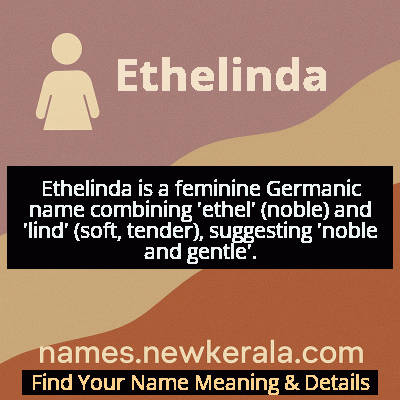Ethelinda Name Meaning & Details
Origin, Popularity, Numerology Analysis & Name Meaning of Ethelinda
Discover the origin, meaning, and cultural significance of the name ETHELINDA. Delve into its historical roots and explore the lasting impact it has had on communities and traditions.
Name
Ethelinda
Gender
Female
Origin
German
Lucky Number
6
Meaning of the Name - Ethelinda
Ethelinda is a feminine Germanic name combining 'ethel' (noble) and 'lind' (soft, tender), suggesting 'noble and gentle'.
Ethelinda - Complete Numerology Analysis
Your Numerology Number
Based on Pythagorean Numerology System
Ruling Planet
Venus
Positive Nature
Harmonious, responsible, caring, and artistic.
Negative Traits
Overly idealistic, superficial, possessive, or jealous.
Lucky Colours
Pink, turquoise.
Lucky Days
Friday.
Lucky Stones
Diamond, turquoise.
Harmony Numbers
2, 3, 9.
Best Suited Professions
Artists, musicians, teachers, healthcare workers.
What People Like About You
Warmth, nurturing nature, artistic flair.
Famous People Named Ethelinda
Ethelinda of Wessex
Anglo-Saxon noblewoman
Documented founder of religious institutions in 9th century England
Ethelinda Marguerite von Schöning
German aristocrat and patron
Significant cultural preservation efforts in 18th century Prussia
Ethelinda Lewis
Botanist and author
Groundbreaking research on Germanic plant species and conservation
Name Variations & International Equivalents
Click on blue names to explore their detailed meanings. Gray names with will be available soon.
Cultural & Historical Significance
Extended Personality Analysis
Individuals named Ethelinda typically exhibit a remarkable synthesis of aristocratic dignity and profound intuitive wisdom. The noble aspect of their name manifests as natural leadership qualities, strong ethical principles, and a graceful presence that commands respect without demanding it. They often possess an innate sense of justice and fairness, combined with the diplomatic skills to navigate complex social situations. The serpent element contributes strategic thinking, emotional intelligence, and the ability to perceive underlying patterns and truths that others might miss. Ethelindas are often described as 'old souls'—people who seem to possess wisdom beyond their years and who approach life with both practical realism and spiritual depth. Their transformative capacity allows them to adapt to changing circumstances while maintaining their core identity, much like a serpent sheds its skin to grow. This combination makes them excellent in roles requiring both leadership and insight—whether in professional settings, family dynamics, or creative pursuits. They tend to be private individuals who reveal their depth gradually, earning trust through consistent wisdom and reliability rather than overt displays of intelligence or power.
Modern Usage & Popularity
In contemporary naming practices, Ethelinda represents a sophisticated choice for parents seeking names with historical depth and unique character. While statistically rare—appearing in fewer than 1 in 100,000 births in English-speaking countries—the name has experienced a quiet resurgence among specific demographics. It's particularly popular in historical reenactment communities, among families with strong Germanic heritage, and with parents who appreciate mythological and nature-inspired names. The name's modern appeal lies in its combination of feminine elegance with underlying strength, its connection to both nobility and natural wisdom, and its distinctiveness in an era of common names. Social media and historical fiction have contributed to its modest revival, with several characters named Ethelinda appearing in recent bestselling historical novels and fantasy series. The name's nicknames—including Etta, Thea, Linda, and Lindy—make it adaptable for modern use while preserving its formal dignity. Its usage pattern follows the broader trend of reviving 'grandmother' names, but with the added appeal of mythological significance and cross-cultural relevance.
Symbolic & Spiritual Meanings
Symbolically, Ethelinda represents the harmonious integration of apparent opposites—the elevated nobility of human civilization with the primal wisdom of the natural world. The serpent element connects to deep archetypal meanings across cultures: in Eastern traditions, serpents represent kundalini energy and spiritual awakening; in Mesoamerican cultures, they symbolize rebirth and agricultural cycles; in alchemical tradition, the serpent represents the transformative process itself. The Germanic context adds layers of meaning specific to Northern European symbolism, where serpents were both feared and respected—creatures of Loki and Odin, associated with hidden knowledge, protection of sacred spaces, and the cyclical nature of existence. Combined with the nobility element, Ethelinda becomes a symbol of enlightened rulership—leadership that draws its authority not from force but from deep understanding, protection that comes from wisdom rather than weapons, and transformation that elevates rather than destroys. This makes the name particularly significant in modern contexts where balanced leadership and ecological wisdom are increasingly valued, representing a bridge between traditional authority and contemporary needs for sustainable, insightful guidance.

